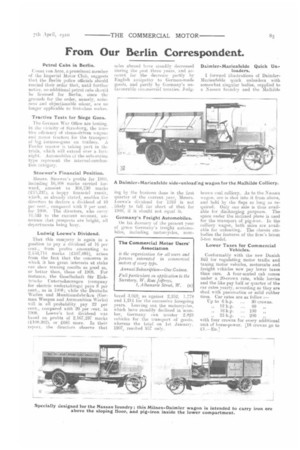From Our Berlin Correspondent.
Page 5

If you've noticed an error in this article please click here to report it so we can fix it.
Petrol Cabs in Berlin.
Count, von Arco, a prominent member of the Imperial Motor Club, suggests that the Berlin police officials should rescind their order that, until further notice, no additional petrol cabs should be licensed for Berlin, since the grounds for the order, namely, noisiness and objectionable odour, are no longer applicable to first-class makes.
Tractive Tests for Siege Guns.
The German War Office are testing, in the v icibity of Strasburg, the tractive effiviency of steam-driven uagons and motor tractors for the transport of big fortress-guns on trailers. A Fowler tractor is taking part in the trials, which will extend over a fortnight. Automobiles of the subvention type represent the internal-combustion category.
Stoewer's Financial Position.
Messrs. Steewer's profits for 19W, including 16,408 marks carried forward, amount to 304,730 marks (C1.5,237), a happy financial result, which, as already stated, enables the directors to declare a dividend of 10 per cent., compared with 9 per cent. for 1908. The directors, who carry 16,333 to the current account, announce that prospects are bright, all departments being busy.
Ludwig Loewe's Dividend.
That this company is again in a position to pay a dividend of 16 per cent., from profits amounting to 2,133,711 marks (I:107,681), arises from the fact that the concerns in which it hiss great interests at stake can show trading results as good as, or better than, those of 1908. For instance, the Gesellschaft fiir Elektrische I7nternehmungen (company for electric undertakings) pays 8 per cent., as in 1008; while the Deutsche Waif en uud Munitiousfabriken (German Weapon and Ammunition Works) will in all probability pay 22 per cent., compared with 20 per cent. in 1908. Loewe's Inst dividend was based on profits of 2,167,237 marks (e108.302}, or £681 more. In their report. the directors observe that
sales abroad have steadily decreased Wain., the past three years, and account 7 for the decrease partly by English antipathy to German-made goods, and partly by Germany's unfavourable commercial treaties. Judg
Mg by the business done in the first quarter of the current year, Messrs. Loewe's dividend for 1010 is not likely to fall far short of that for 1009, if it should not equal it.
Germany's Freight Automobiles. Un 1st January of the present year of grace Germany's freight automobiles, including motorcycles, niim bered 3,019, as against 2,232, 1,778 and 1,21.1 for the successive foregoing years. Leaving out the motorcycles, which have steadily declined in number, Germany can muster 2,823 vehicles for the transport of goods. whereas the total on 1st January, 1907, reached 957 only. Daimler.MarieMelde Quick Unloaders.
I forward illustrations of DaimlerMarienfelde quick unloaders with somewhat singular bodies, supplied to a Nassau foundry and the Malhilde brown coal colliery. As to the Nassau wagon, ore is shot into it from above, and held by the flaps as long as required. Only one side is thus available for discharging purposes. The space under the inclined plane is used for the transport of pig-iron. In the colliery wagon, both sides are available for unloading. The chassis embodies the features of the firm's latest 3-ton model.
Lower Taxes for Commercial Vehicles.
Conformably with the new Danish Bill for regulating motor traffic and taxing motor vehicles, motorcabs and freight vehicles now pay lower taxes than cars. A four-seated cab comes under a 20-crown rate, while lorries and the like pay half or quarter of the car rates yearly, according as they are shod with pneumatics or solid rubber tires. Car rates are as follow :—
Up to 6 h.p. ... 30 crowns.
„12b.p. 60 „ „ 16 h.p. ... 100 „
„ 25 h.p. 200 „ with four crowns for every additional unit of horse-power. [18 crowns go to -Cl.--En.]






















